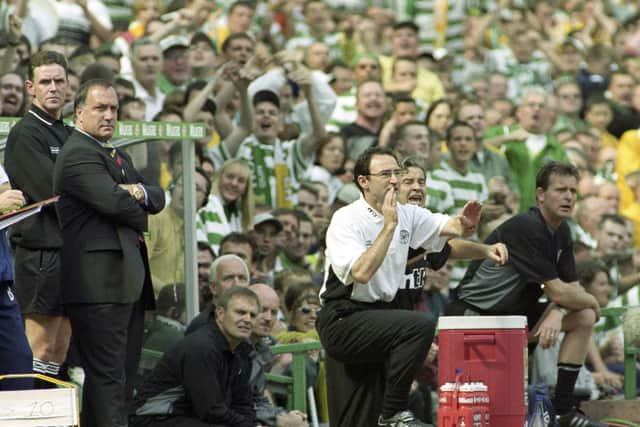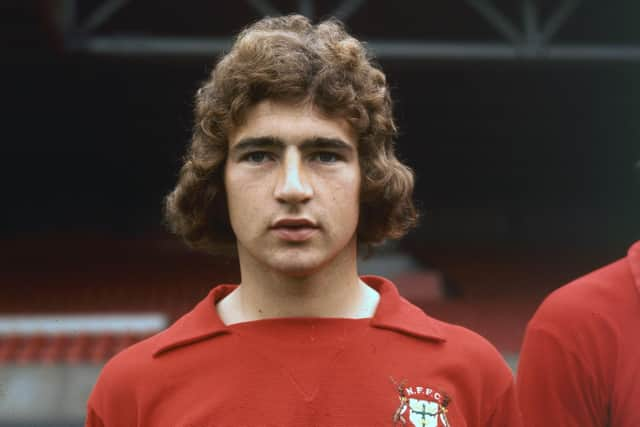'My wife wasn't earwigging': Martin O'Neill recounts Celtic eviction from Rangers hotel, early years at boarding school and Northern Ireland desire


Of course, he would be welcomed back by supporters either way, new book or not. That’s not perhaps so in the case of Brendan Rodgers and Neil Lennon, two of those who have succeeded O’Neill in the Celtic hotseat and who, like him, enjoyed considerable success.
Relations have since soured though time is, of course, a great healer. And O'Neill is sympathetic. He is adamant that this would have been his fate, too, had he not stepped aside in 2005 after his wife, Geraldine, was diagnosed with lymphoma. Otherwise, he would have stayed until long after his natural shelf-life, with Dermot Desmond, the club’s majority shareholder, having asked him to take “ownership” of the club. “By that, he meant he wanted me to run the football club the way managers would run his other businesses,” O’Neill explains in a conversation with The Scotsman.
Advertisement
Hide AdAdvertisement
Hide AdDesmond put his full trust in the Northern Irishman, who he summoned from Leicester City when many other options were available. O'Neill remains eternally grateful.


“I would have stayed until I outstayed my welcome, absolutely," he says. “I was completely attached to the club at the time. I loved living in Glasgow. I would have stayed there until results went badly and I got bombed out. I would not have left under my own volition. I would have been there at the bitter end still saying, 'we can turn this round!'”
O’Neill’s status among Celtic fans seems protected. Even at his book’s launch in Oswestry of all places on the English-Welsh border on Tuesday night, there were a couple of Celtic supporters in attendance. “They are everywhere!” says O’Neill.
He laments the recent treatment of Lennon, forced out during a miserable attempt to secure ten in a row. He, of course, signed Lennon – “wee fat Plug!” as he referred to him recently – for a second time in December 2000.
“Obviously Celtic wanted to get ten in a row. But I don’t think that should mask his achievements both as a player, where he was fantastic for me, and as a manager. That would be a shame. But definitely in time. Maybe not tomorrow, maybe not Friday week, but, sometime, he will be given his proper position in the history of the football club.”


O’Neill himself has no worries on that count. The history of such a storied club has been written many times but authors focusing on the post-2000 era might settle on the 6-2 win over Rangers shortly after O’Neill took charge when choosing the result of this millennium. “Like a lot of things, that has possibly become more significant as time goes on," he says. "But the more I think about it, it possibly was. It gave us confidence we could compete with Rangers, even though they mauled us in November, by which time we probably had enough confidence to carry the season through.”
The weekend got off to an inauspicious start when O’Neill’s wife, Geraldine, and Alana, his youngest daughter, were evicted from their hotel, the Crutherland in East Kilbride, on the eve of the match. Why? It was Rangers’ pre-match base.
“It was astounding!” recalls O’Neill. “I had stayed there during that week. You’d have thought someone might have just come up and said, 'you know, by the way Rangers stay here'. I tried to make a little bit of a joke by saying I don’t think Stefan Klos or whichever had a photograph of my wife in his pocket. I don’t think that would have been top of the list.”
Advertisement
Hide AdAdvertisement
Hide AdAs O’Neill relates in On Days Like These, a self-penned memoir published on Thursday, “it transpires that the Rangers manager has been told that my wife and daughter are in the hotel. Rangers use the Crutherland as a base for many of their games and have a contract with them. If Geraldine and Alana don’t leave immediately, Rangers will cancel their contract with the hotel.”
O’Neill was hardly wet-behind-the-ears. But it was an early indication of what life on the Glasgow football front line was like, although O’Neill has few complaints. “I have to tell you I can count on the fingers of one hand when I got verbally abused on the streets of Glasgow,” he says.
He recounts the Crutherland episode with some amusement. “My wife could not have known Dick Advocaat and he certainly would not have known her,” he says. “In all honesty, it was probably just the hotel wanting to make sure everything was right for them. I don’t think my wife would have been earwigging on the team talk. Can you imagine going to the door, ‘who is that woman out there?!’ It was a fun incident. Although my wife didn’t take it too well at the time as she was being ushered out of the door!”
There was no need for a spy in the camp. Celtic won handsomely in any case, inspired by Chris Sutton, who O’Neill describes as a “landscape-changing” signing, not that he'll go out of his way to tell him that.
O'Neill realised there was an urgent need for another striker to reduce the load on Henrik Larsson after he had phoned Mark Viduka on the eve of pre-season training. “He was in Melbourne,” recalls O’Neill. “I said, ‘so you won’t be training tomorrow morning then?’ I might have omitted it from the book, but actually Mark Viduka leaving, and Chris Sutton coming from Chelsea, was a landscape-changer for us.”
The omission may or may not have been deliberate. "I have a bit of banter with Chris, he used to say to me, 'you won't find me doing that punditry'," says O'Neill, who is tickled by Sutton's omnipresence in the media.
-----------------------
O'Neill's booty from a lifetime in football seems unbeatable. Eusebio’s shorts, purloined from the already topless great man after O’Neill had scored his first international goal and Eusebio had struck his last last in a 1-1 draw between Northern Ireland and Portugal in 1973.
A dress shirt from Alex Ferguson that was borrowed and, to date, never returned, after O’Neill was invited to stay over at Chez Ferguson at short notice following Ryan Giggs’ testimonial v Celtic. "Every time I met him, even in moments of despair, his last words going out the door would be: 'And you’ve still got my shirt!'" chuckles O'Neill.
Advertisement
Hide AdAdvertisement
Hide AdHe also has a Brazil top, swapped with Clodoaldo, after O'Neill had played for an all-Ireland team – although they were billed as a Shamrock Rovers XI for political reasons – against the then world champions in a friendly nearly 50 years ago.
Throw in a couple of European Cup winner’s medals for Nottingham Forest – he literally did throw his medal towards Brian Clough after being left out of the 1979 final against Malmo – and it’s a remarkable, if by no means complete, collection of souvenirs.
Some possessions were lost on the way. Or, indeed, were confiscated.
O’Neill attended boarding school from 11 to 15-years-old. Somewhat unusually for someone brought up in Kilrea, he developed an affinity for Sunderland. This, he reasons, was because they had two Irish players, one of whom, Johnny Crossan, hailed from Derry City, near to where O’Neill had been sent to school at St Columb’s College. “It was austere,” he says. “Really austere. Think back to Tom Brown’s schooldays.”
An FA Cup quarter-final replay between Sunderland and Manchester United in 1964 certainly didn’t feature on the curriculum. It finished long after lights out in any case. O’Neill borrowed a friend’s crystal radio set.
The dean of the college was on the prowl and heard muffled commentary coming from a bed in the dorm. “I receive six slaps with a leather belt,” writes O’Neill.
Worse, Sunderland lost 5-1. “The first week or ten days, all you are doing is standing on the steps of the college and you are looking out over the hills, wondering what is happening at home,” he says. “I didn’t like it.”
A few years later, it wasn’t homesickness that was the issue. By now well on the way to establishing himself as a professional footballer in Nottingham, he was perturbed to learn his parents, two sisters and at least one brother were intent on moving across the Irish sea to be with him.
Advertisement
Hide AdAdvertisement
Hide AdThe Troubles were a factor. But O’Neill, who had been studying for a law degree in Belfast while playing part-time for Distillery, was enjoying some new-found freedom and had met an unkempt new friend “with plenty to say for himself” called John Robertson.
“Last Monday afternoon I was sitting in a hall at Queen’s University listening to a lecture on jurisprudence,” he writes.
On Days Like These, the title taken from a Matt Monro song, is a compelling read. A poignant one, too, in places. Clearly, Clough is often centre stage. The legendary manager died during O’Neill’s last season at Celtic and O’Neill describes being asked to speak at his memorial service at Pride Park, home of Derby County, as “one of the biggest honours of my life”.
He has also recently attended the funeral of Terry Neill, another significant figure in his life. The then Hull City player manager handed him his international debut as a 19-year-old sub for Northern Ireland against what was then known as the USSR.
O’Neill feared he had quickly blotted his copybook after complaining to a journalist when he was left out of the starting XI v Spain soon afterwards. George Best had turned up for duty worse for wear after a bender en route to Hull, where the game had been moved following Bloody Sunday.
“I think about how brash I was – I should have been lining up with George Best, honestly?” reflects O’Neill. “The more I think about it the more embarrassed I get.”
“Not only did Terry scold me, rightly so, for that episode in Hull, he was the first one to make a bid for me. After putting me in the squad in October against Russia while I was still a student at Queen’s University, he gave me 20 minutes. He then put a bid in from Hull City to Distillery for me for £10,000, which Forest quickly topped by offering £15,000.
“If Terry had not made that bid in the first place, hopefully I would still have gone across (to England), but it might not have happened so quickly. He was the instigator in many respects.”
Advertisement
Hide AdAdvertisement
Hide AdIt worked out for the best. With the best will in the world, Hull City were unlikely to win the European Cup once, never mind twice – and in successive seasons. “I could have been languishing in the Fourth Division!” says O’Neill.
Now a very sprightly 70, what’s next? There’s a vacancy at Northern Ireland which seems tailor made for him. He defers to his Edinburgh-based namesake, Michael, when it comes to candidates for this job opportunity.
“I assume the Irish FA have made Michael their first port of call, because he did such a good job there,” he says. “I think there’s possibly an element of ageism playing a part in these things.
“Do I have the same determination? Absolutely. I don’t think 19 games at Nottingham Forest, although we won the last three of them, is how you want to end things (as manager). But sometimes you are not in control of that. Could I manage now, and have the same appetite? Absolutely. There is no such thing as a perfect job. But if someone at the IFA had any thoughts … who knows what might happen?”
Returning home to manage Northern Ireland would have made for a perfect last chapter in his book. As it stands, it ends on a slightly low note as he reflects on his time feeling like “an outsider” while manager of Republic of Ireland. He is savaged by the press for his supposedly out-dated tactics and leaves following a 5-1 World Cup play-off defeat against Denmark.
He does accept the charge of Luddism in one respect. His memoir was written in long-hand. He then photocopied the pages and sent them to his daughters, who typed them out. As well as giving abundant thanks to Aisling and Alana, no wonder their husbands earn a mention in the acknowledgements for their “patient perseverance”.
Before we finish talking, O’Neill casts an eye over the modern game. In many ways, it’s much the same as it always was. O’Neill acknowledges that his frustration at Viduka’s refusal to return to Celtic had to be tempered by the memory of his own one-man strike at Nottingham Forest after being left out of the side one too many times by Clough.
Before we finish talking, there’s one eternal truth he wishes to impart. Quality will always, always, shine through.
Advertisement
Hide AdAdvertisement
Hide Ad“Obviously pitches have changed, rules have changed, obviously we have VAR now and the introduction of the no backpass rule, all supposed improvements,” he says. “Let me put it this way, if George Best arrived down now to play, with pitches in the shape they are in, with less severe tackling – he wouldn’t get what he got against Chelsea with Ron Harris – then he would add at least another 100 goals to his goal tally in his career.”
As for O’Neill, how might he have fared as a player now? His only wish is that VAR had been around at the Vicente Calderon stadium in Madrid on July 4, 1982 for what was, effectively, a World Cup quarter-final between France and Northern Ireland, in the second group stage. Although they eventually lost 4-1, O’Neill had given his side the lead after 25 minutes. He was flagged offside when onside by at least a yard.
“We might – because we were great at holding on to a lead – we might have been playing in the semi-final of the World Cup,” he says. “Now that really would have been something.” Astounding, even, to use one of the engaging O’Neill’s favourite words.
On Days Like These – My Life in Football by Martin O’Neill, published by Macmillan. £22.